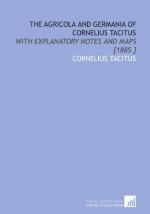|
This section contains 432 words (approx. 2 pages at 400 words per page) |

|
The Agricola; and the Germania; Summary & Study Guide Description
The Agricola; and the Germania; Summary & Study Guide includes comprehensive information and analysis to help you understand the book. This study guide contains the following sections:
This detailed literature summary also contains Topics for Discussion and a Free Quiz on The Agricola; and the Germania; by Tacitus.
The Agricola and the Germania, by Cornelius Tacitus, serves two purposes as a historical document. First, the book serves to pay tribute to one of the greatest commanders over Britain in Roman history, that of Commander Agricola. Due to his status as Agricola's son-in-law, Tacitus tells the story of Agricola's rise to power over Britain using both his own personal experiences with the man as well as stories from Agricola himself. Although Tacitus is limited in his knowledge of geography and military history, his knowledge of the life of Agricola is unmatched in any other tribute. Tacitus tells of Agricola's early years in training for the military, his rise in the ranks, and his unparalleled victory over the British rebel forces at the time. Finally, he tells of Agricola's fall from grace with the ruling Emperor of Rome, and his eventual death. Tacitus' use of style and description within the story show Agricola not just as a military force, but as a kind and tempered military genius.
In the second part of the book, Tacitus tells of what he believes to be the greatest threat to Rome, that of the people of Germany. Described as being of Celtic, Gaul, and indigenous decent, the people of Germany are described first in terms of their dress, traditions, and overall culture. Tacitus stresses their overwhelming sense of family, their abilities to fight, and their passion for freedom several times, showing his belief that these forces make the people of Germany particularly dangerous. He also describes each tribe separately to show their differences, as well as to tell readers which tribes are loyal to Rome, and which are a threat to Roman society. While his descriptions of geography and historical reference are again lacking in this book, his accounts of the people of Germany and their traditions are accurate and form one of the most comprehensive descriptions of the people of Germany during this time.
The Agricola and The Germania are two very different stories, but both have similar undertones. The Agricola, a homage to a great military leader, serves both as a eulogy and as a lament against the tyrannical Emperors of Rome who rewarded military achievement with disgrace and disapproval. The Germania serves both as a character analysis of the inhabitants of an unknown region, and also as a warning to Rome about the power of freedom and self preservation. Both stories are written with a lack of geographical or historical precision, but these shortcomings are overcome through Tacitus' strong writing skills and passion for his country, and their survival.
Read more from the Study Guide
|
This section contains 432 words (approx. 2 pages at 400 words per page) |

|



